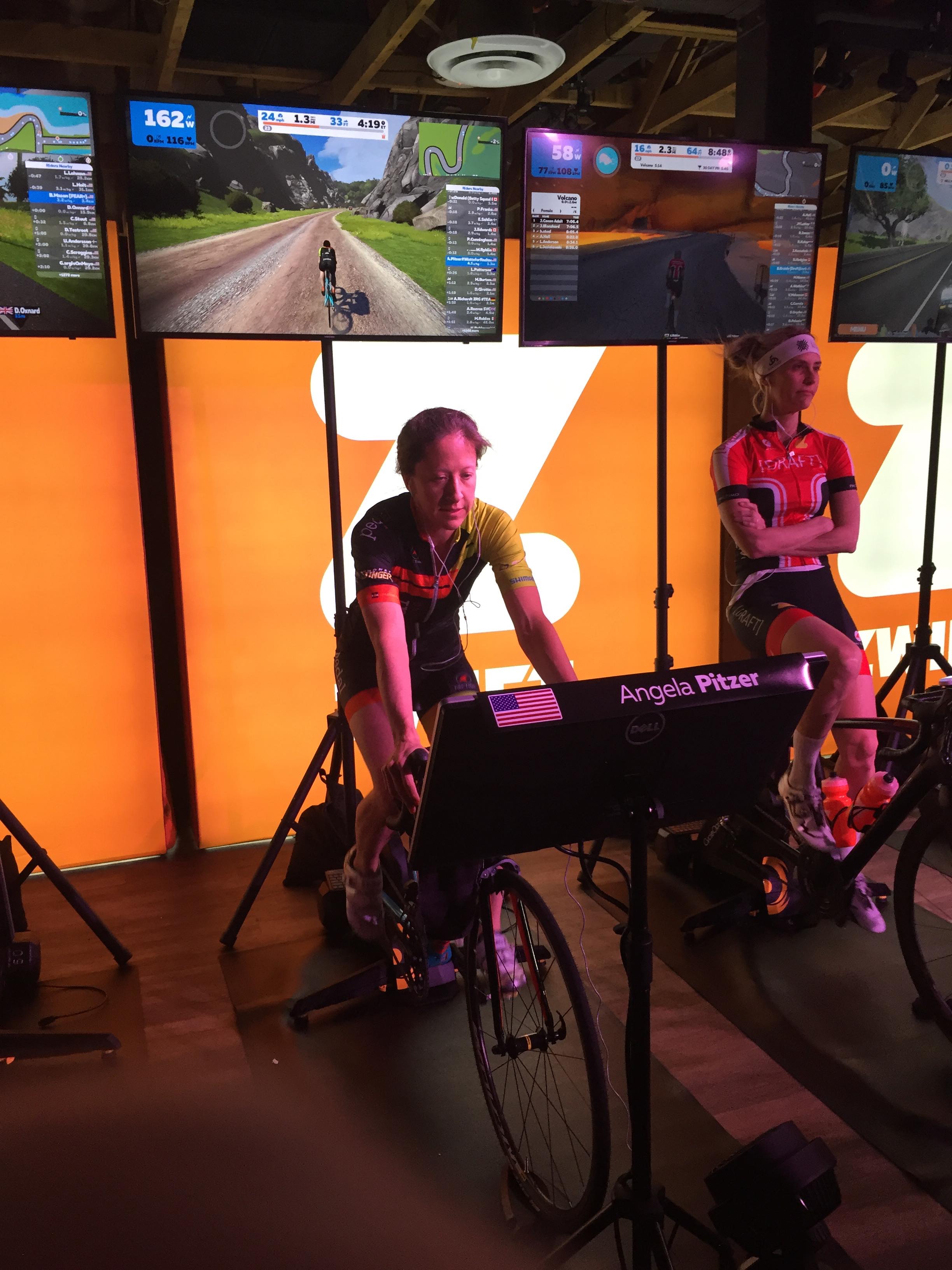Angela: Okay, so I actually spend a lot of time on my trainer, unfortunately, doing workouts just because the most convenient thing for me to do as a mom is just hop on the trainer. I was on Zwift.com one day just kinda looking to see what group workouts there were and I saw this post about this KISS Crit: North American KISS Crit.
I thought, “Well, what is this?” It ran from December 7th through February 28th and they took two weeks off during the holidays. You raced every Thursday night. We mostly did the volcano circuit. There were two time slots: You could sign up for the 6:00 PM or the 9:00 PM and you had to race that same time slot for all 10 races.
The only thing you had to do was have a Zwift power count; you had to wear a heart rate monitor; you had to have your rides/races posted to Strava, and they had to be public. You could use power-ups in these races and you could use any bike you wanted except for the TT bike. You had to have a smart trainer or regular trainer with a power meter on your bike. They weren’t accepting Zwift power results.
I thought, “Okay, well I can do all those things” and then I kept reading. They said the best 7 out of 10 races would count the top finalists and they would win an all-expenses-paid trip to the finals at a date later to be announced. I thought, “Okay, well I’ll try this and see what it’s about.”
You know, the five races I did last year I got dropped somewhere in the beginning of each one of them and I was really frustrated. I wanted to see why was it happening. When you’re on Zwift, whether you’re riding or racing, you can see the watts per kilogram that you can put out versus the people that you’re riding with. I thought this would be a perfect way to see, you know, is this just a thing that I’m not strong enough? I don’t have a high enough FTP? Or am I just really lacking race experience and that’s why I’m frustrated and having trouble? This was a great way to figure that out so that’s the whole reason why I got started in the series. I never realized I’d have a shot at qualifying. That wasn’t why I signed up to do it. I just wanted to figure out what were my struggles.
Jessica: So, did you find them out?
Angela: I think so. I mean, it was kind of interesting because in the first race that I did I had a technical issue. I got put on the wrong course. Me and this other woman did, so we didn’t even really get to ride the race. Then in the second race, I found out that I just wasn’t able to keep up with the front group and I finished 4 minutes behind them. I got really kind of upset because I was looking at the results and looking at the watts I was holding, the watts they were holding, and I was looking at this going, “You know, I ride at the same watts they do. I am just as strong as these other women, why can’t I keep up?”
In the third race I did, I ended up being 1:25 behind the lead group, but I caught up during the middle of the race. I finished with them. From then on, I just made it my priority to make sure I started fast and make sure I was able to keep up with the group at all costs. I was able to do that throughout the whole rest of the series. As I was able to stay with them, I learned that I didn’t have a strong enough sprint as the other women did so sprinting was something I needed to work on.
Each race you learn more and more with what you’re able to do and what your strengths and weaknesses are, and I feel like it gave me this whole new season before the road season started.
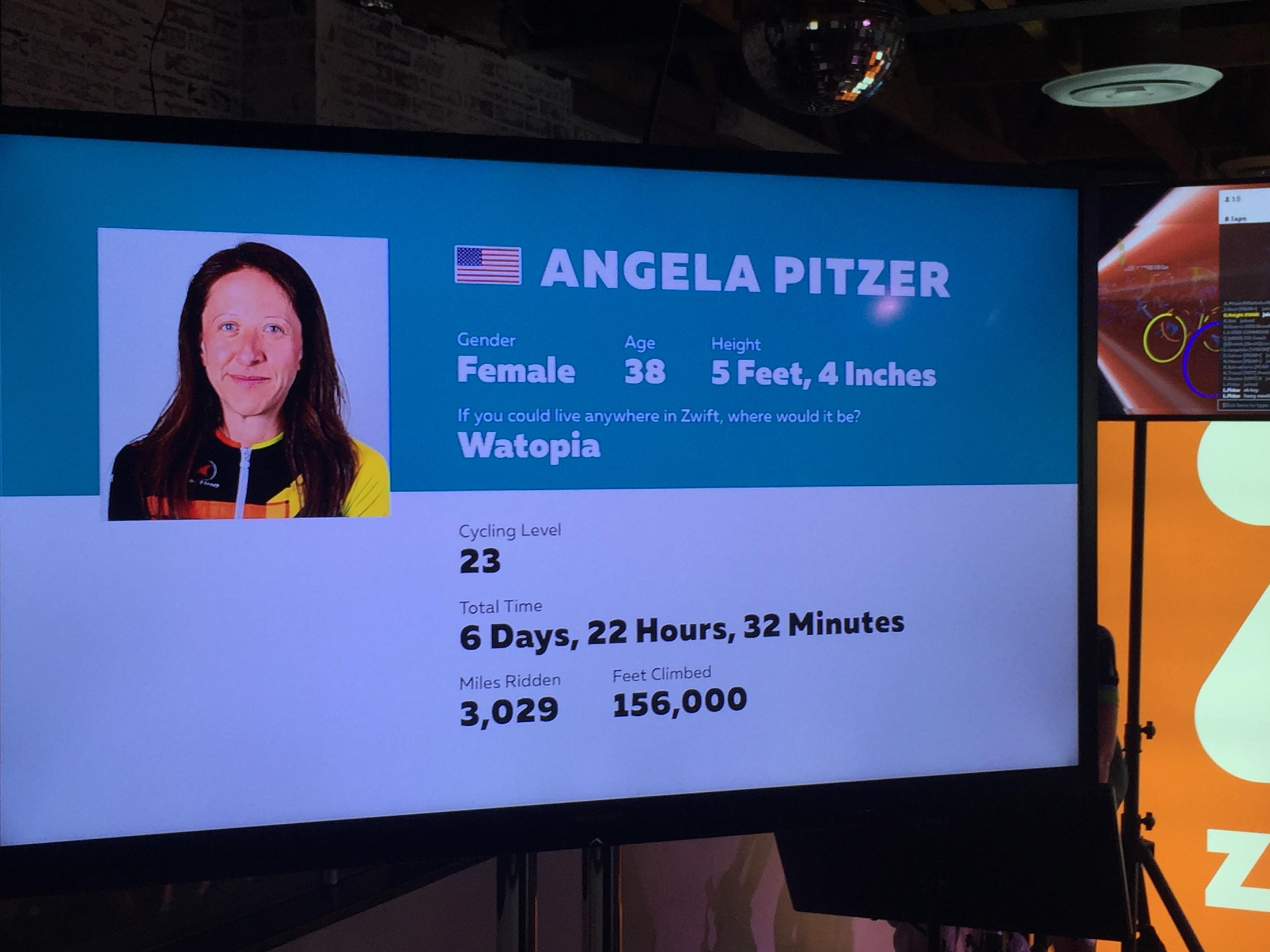
Jessica: Yeah, no kidding. Do you think all that training and stuff will transfer over to road?
Angela: I sure hope so, at some point. The first few races have been kind of frustrating. It’s like, “Now I know what I need to do. I just need to get out there and execute it.”
Jessica: Do you know what next race you’re going to sign up for?
Angela: I’m going to try the team time trial this weekend at Hess. I’d like to sign to sign up for Fed Center crit. I think Guanella is my actual first A race of the season. I got to kind of get moving on that.
Jessica: What was going through your mind when you found out you made it to the finals?
Angela: I really couldn’t believe that I had made it to the finals. And there’s kind of a story behind that: technically speaking, I came in 6th place in the series. I came in 6th place by 3/100’s of a second. And in racing we know how crucial those 1/100 of seconds can be sometimes.
One of the women who was in the Top 5 had a prior commitment so she could not make the finals. Then they asked me if I was available. On March 5th I finally got an email from Glen Knight, who is one of the founders for the KISS organization that put on the race series that I had been invited to the finals. I was really excited ’cause the series ended February 28th and in my mind I was kind of done and it was done and it was time to move on, to train for the regular season.
I was really excited. I was like, “I’ve got a month to prepare” and as you know, we prepare for our A races 3-6 months ahead of time. You know, we put a lot of effort and a lot of work into it, so I was like, “Oh my goodness, I only have a month. I gotta get ready. I gotta figure out what I need to do.”
Jessica: So, what did you start doing? How did you train for it?
Angela: I figured that the best thing I could do is to try to do 1-2 Zwift races a week and looking at the schedule for the next month, there weren’t a lot of women’s-only races, so that meant I really needed to just sign up for races. I did a lot of those against men. I thought this would be the best chance to build and keep my fitness. I would just try to hang on with the A group. You know, the A-riders, the ones who ride between 4-5 watts per kilogram.
I’d usually make it the first half of the first lap and then I would settle in with the B group. I was able to hold on when I got dropped from those A’s. I would just try to finish as best as I could in that group. I would do that 1-2 times a week. I would go outside and work on sprinting ’cause it’s not one of my strong suits. And you know, the crazy thing about sprints in these e-crits is that they’re really like one minute to one minute-and-a-half long, so they’re not really like your traditional length of the sprint that you would do in a regular crit. You were in extended lengths of power longer. I tried to focus on my diet and try to be really regimented in what I ate.
Because part of Zwift racing, like when you go do these live events, they weigh you to make sure the race weight you’re putting in is accurate, so the game is actually figuring out your watts per kilo correctly. They call it weight-doping. They want to know that you’re not doing that.
But it was the same kind of things that you would do in real life training for a real race outside. That’s kind of the stuff I tried focusing on.
Jessica: Wow. That’s crazy. How’d you do in all those different little races leading up to it?
Angela: I didn’t do too bad. In the B’s, I would come in like 3rd or 4th, but there may only be 5 or 6 people in that group. I just tried to make sure I was keeping my average watts high and my watts per kilogram as high as I possibly could. I just tried to push myself as hard as I could every race.
Jessica: Have you retested your FTP since doing this race?
Angela: I have. Actually, I use Exert. Exert will figure out your FTP like per training ride you do or per race you do. So, you always have super up-to-date FTP. So, between December and now, I’ve actually raised my FTP by 26 watts. I’m really happy with that improvement.
Jessica: That’s awesome. Wow. So, when you got to California and you met all the other finalists, what were they like?
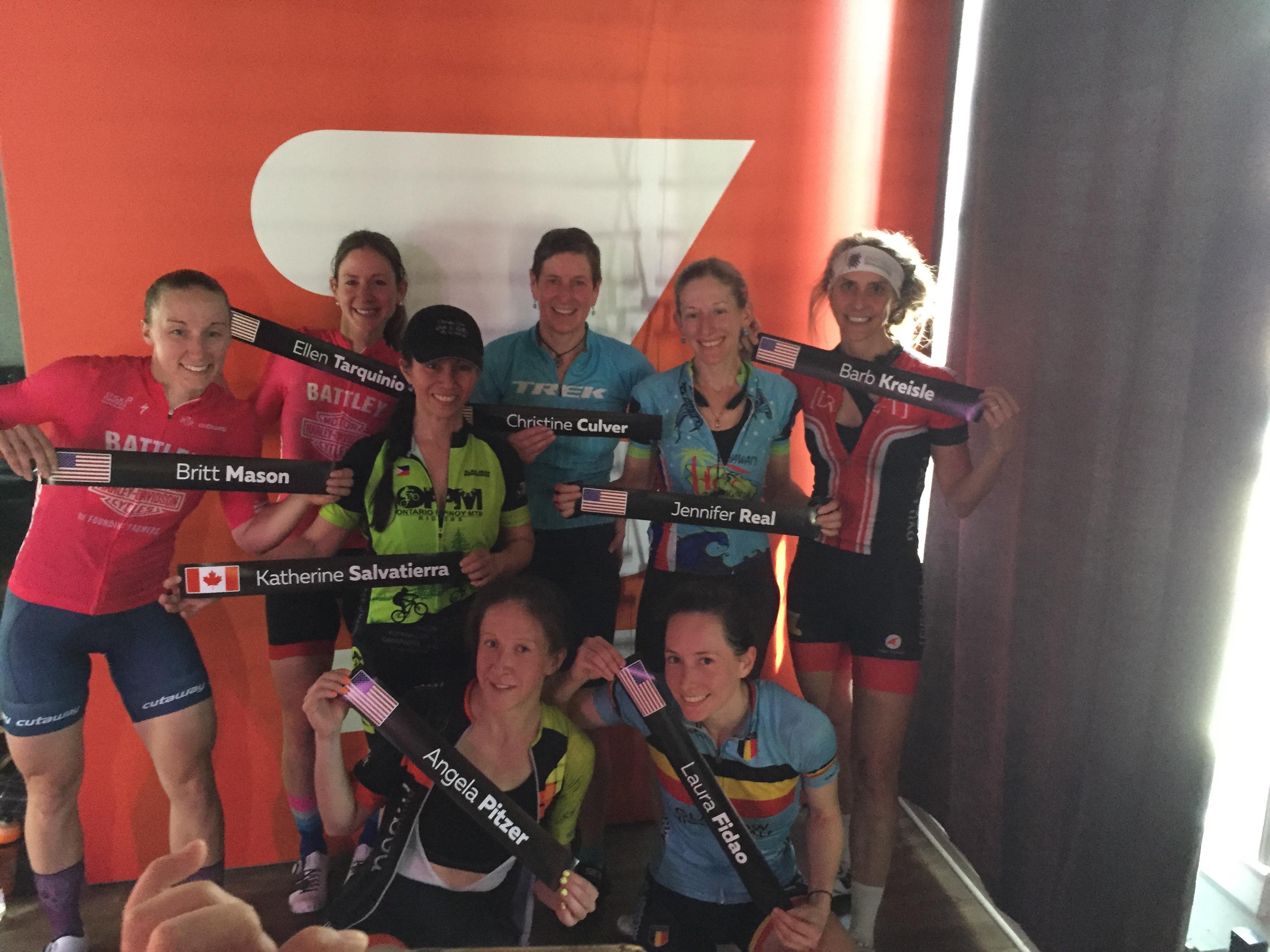
Angela: You had women from mostly all over the United States. There was one woman from Canada that came and everybody had kind of an interesting story. The first woman I met was Barb and we shared an Uber from the airport to the hotel, where they put us up in. So, talking to her kind of made me feel like, “Oh no, am I in over my head with this?” because she rides with Kristin Armstrong and she was a pro mountain biker in the 1980’s and she is a marathon skier; she does marathon ski races, so she’s in super great shape. Then we got to the hotel and we met some of the other women.
For instance, Brit Mason – the woman who won the race – she’s a firefighter and she focuses on ultra-mountain bike races – 100 miles or more. From meeting her, most people don’t choose to be firefighters. It’s really one of those jobs that I think is kind of above and beyond your average person. You really have to be willing to lay your life down for other people. She just really exudes not only physical strength, but strength other ways, so I really admired her for that.
I met a woman from Hawaii. They only have 5 USA-sanctioned races a year in Hawaii, so she’s on Zwift to be able to race. There was another woman from Alaska where there are no sanctioned races where she lives, but she’s actually on a board that puts on bike races.
I met another woman named Kate, who’s a stroke survivor. There was another girl, her name’s Laura, and she just recently got married three weeks ago. Her husband lives in Scotland, but she works in the US, so she goes back and forth. She rides Cross. I believe she’s a Cat 3. She rides cross for the US and cross in Scotland.
The woman who came in third place, she’s a real estate agent and her and her husband ride tandem bikes. And they actually train with the Produce cycling team ’cause they live in Indiana. And then there was another woman, who is married. Her and her husband both qualified to do this race. And she’s married to a World Champion, Double Master in Road and Time Trials. So, you have these people from all walks of life who have different experiences. Some have never raced outside. Some race indoor and outdoor. Just have very different experiences. It’s just really neat to meet them.
Jessica: I was just going to say, how did you feel coming from Colorado with your own life and like, meeting all these crazy ass racers?
Angela: I really felt like I was in over my head. I don’t ride with famous pro cyclists and I don’t have these amazing jobs. You know, I just felt really – it was really humbling.
Jessica: How amazing is that though? You got to race against them. You’re just as good as those guys.
Angela: But it was really cool because you know how it is. The cycling community is a different community. It’s different than other sports. In other sports, people are constantly bragging about their equipment and the people they meet and how much money they have. The cool thing about cycling is that people are really down to Earth. You know, we really relate to each other on a personal level and we don’t care who has what. The person next to us could have a $20,000 bike and yours could cost $2,000 and it doesn’t matter. You know, we’re all there, pushing ourselves and working toward common goals and we love the sport.
It’s just much more down to earth and real. And so it was really neat to meet these women and the guys too. You know, who were racing in the men’s finals. People inviting me – “Hey, if you’re ever out here, look me up and we’ll get together and go for a ride.”
Barb was like, “You should try skiing. I’m going to get you on cross-country skis. When your kids get a little older, come out to Idaho, and I’ll teach you to ski. You’ll love it.” You know, just neat people.
Jessica: I don’t know if you’ve been able to watch the recording or whatever of you guys racing, but while we were all surrounding Michelle’s TV, they panned to you guys a tiny bit, then it’d be like, the announcer dude for a while. What was going on when you weren’t being recorded? What happened behind the scenes? Anything crazy cool?
Angela: Um, there were some crazy frustrating things that happened behind the scenes.
Jessica: Oh really? Like what?
Angela: So, the hard thing is, we had a lot of drop-outs in our race. And what I mean by “drop-outs” is when you’re on your trainer and you’re pedaling and you’re doing whatever you’re doing for watts, we’d have drop-outs for watts where our power would go to zero. Or it would drop to 1/3 of what we were doing.
In our race, I feel like that kind of changed it for some of us. That was one of those behind-the-scenes that you didn’t see. There were times when people like Katrina, were in the front group and her power dropped. She ended up :50 behind everybody at pretty much the very beginning of the race. And so, they had kind of told us that once we get to these preme laps, “We can’t power anybody up to get them back to the group. You have a drop-outs, you have to get back on your own.” They would move the amp stick to get us going again, but they weren’t going to use the power-ups to get us back.
We all had power-up buttons we could use in the race. They would come over and push the button down and hold it down and you would get a giant boost in your watts. They’d go up to 1500 watts and then they’d catch you back up to the group, but once those preme laps started, they told us they weren’t going to do that anymore.
That was something that was going on kind of behind-the-scenes, behind the camera, that wasn’t necessarily talked about.
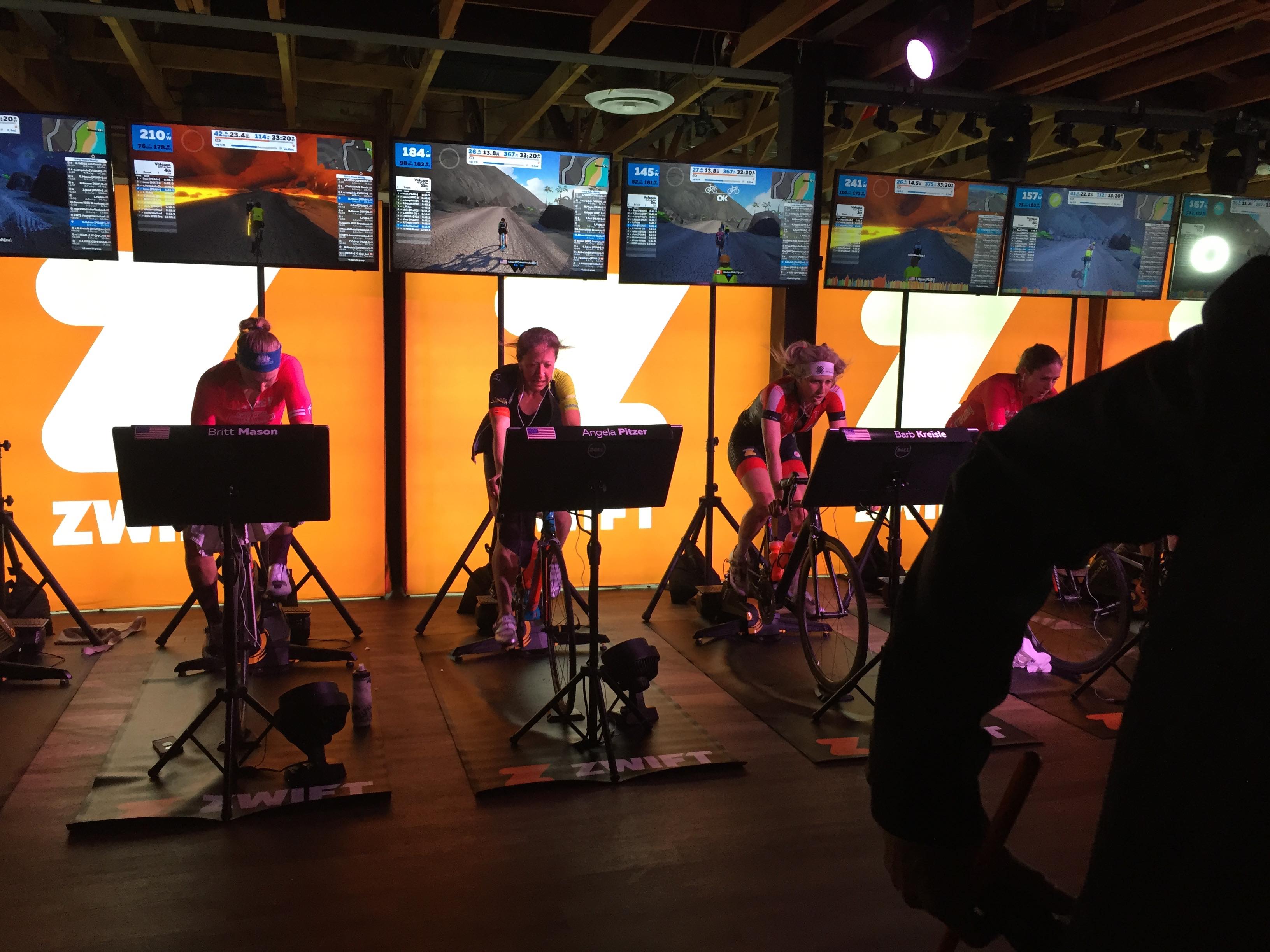
Jessica: I know there was one instance where they panned over to you and you were yelling or saying something and none of us knew what you were talking about or what you were trying to say.
Angela: Yeah, I had a drop-out towards the end of the race and I actually had 11 of them during the whole race. My one that really frustrated me was during the 8th lap and my power dropped for fifteen seconds. And at that point, I had already made the break from the group that I had been riding with; I was :20 in front of them, just trying to hold on because that was going to put me in 6th place. I had a drop that lasted for about :15 and one of the women, she caught up to me and she took advantage of it and she went; I mean, you can’t blame her.
Any of us would have done the exact same thing. And so, I feel like I let that psychologically get to me though because when I got back up and going, she was only 7 or 8 seconds ahead of me;
and I kind of wonder, had I been willing to push it, had I been mentally tougher, I kind of wonder, “would I have been able to catch back up to her?” Would I have been able to chase her down or not?
And so, even when we did have those drop-outs and they were frustrating, I kind of feel like that’s one thing I learned, that maybe I’m not as mentally tough in some situations as I need to be and so that was eye-opening for me; that was good for me to see.
Jessica: Well, and that’s something you can take with you to more races too. You’ll remember that moment and you’ll be like, “I let that moment fly and I didn’t push as hard as I could have or whatever, you know I’m not going to let it happen again.” When you find yourself in a break, you won’t let it happen again.
Angela: Right, exactly.
Jessica: I wouldn’t be hard on yourself though because you can’t help that there was a fifteen second power outage. I lose my mind when the power drops for three seconds. I’m like, “What is going on? I’m not at my power right now?”
What deal were they using? Was it CycleOps, Tacx? Who were they using? What was the trainer?
Angela: They were CycleOps. It’s hard to know. I don’t think it was necessarily the trainer because they allowed us to have our cell phones and to have music and you know, nobody was telling people to put their phones in airplane mode when they came in. So, it could have been a million different things.
You know, to Zwift’s credibility, this is only the second or third live competition they’ve ever put on before. You know, all this is kind of in its infancy, and so, between that and the fact that they were actually moving buildings that weekend – they were moving offices – they really did a great job putting the event on.
Jessica: Where was it actually? Was it in their office? Was it in a bar?
Angela: No, it was a nightclub called, “On the Top” and it was kind of a speakeasy, little place, like on the third floor in the building. It was a really fun place. For the live event, they had tickets on Eventbrite and they had catered food. It was an open bar. It was a really party atmosphere. It was really fun.
Jessica: That’s cool. I had absolutely no idea. I saw Nate 1,000 times ringing his cowbell and the rest of the crowd. You could only see the rest of the stage with you guys up there riding, but other than that, I had absolutely no idea where they were at.
Angela: It was a fun little nightclub.
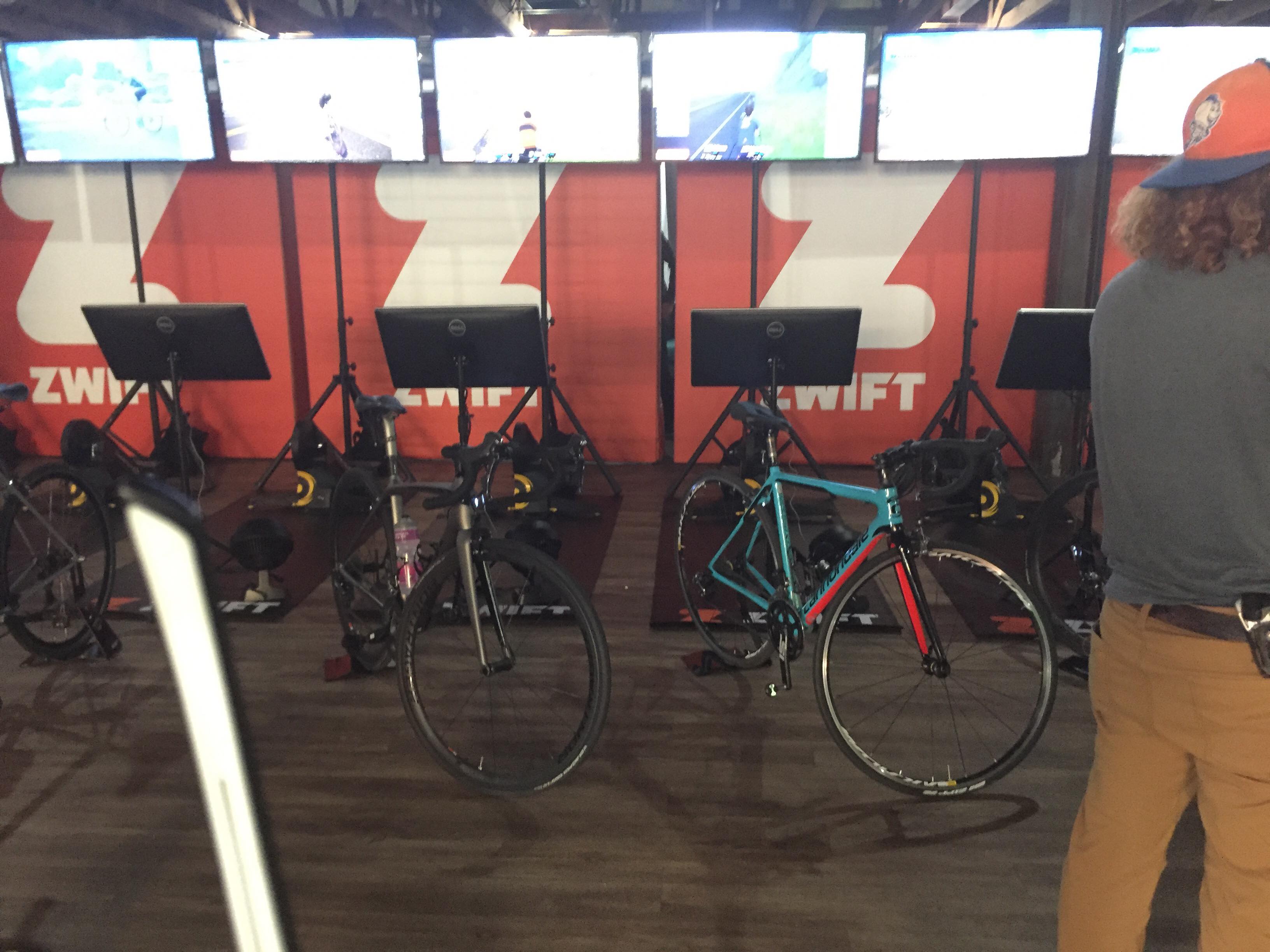
Jessica: What was your favorite moment from this experience or most memorable?
Angela: So, I would have to say there were two general moments. I really feel like meeting the women and the men that I met and the friendships that I made. I’m still racing in an eight-week racing series with four of these women and we chat a couple times a week through Facebook. You know, whether we talk about racing or things that are going on in our lives or whatever. And so, I’ve really enjoyed that.
A favorite moment from the race was in the 7th lap, we had 1/2 a mile to go before the elimination banner and I managed to pull away from the group at this point and put a 5-7 second lead on them because I really wanted to make sure I didn’t get eliminated.
And so, I was able to do that and once I got through the elimination banner and knew I wasn’t going to be eliminated. I hit 8.6 watts per kilogram and just tried to get away further away from them and that’s when I kind of made that break; that ended up being the :20 break I got on them, so that’s the first time I’ve ever made a successful break in a group, either in a virtual race or a real-life race. That was one of my favorite moments.
Jessica: Yeah, we remember watching that too and we were like yelling at the tv; we were like, “OH MY GOD! She’s going for it! Keep going!”
Angela: It was so fun because Brit Mason was on one side of me and Barb was on the other side of me and at that point. Barb was out of the race and Brit was in the lead with Ellen. She looked over and they were both like, “Go Angela, Go!” Liz was like, “Thirty seconds of your life, just do it! Just go!” It was so in the moment and so fun.
Jessica: What was the most difficult moment because I’m sure there were plenty.
Angela: I think the most difficult moment was that power drop and just not being in a place mentally where I needed to be. The whole race was hard. I think a few minutes into this thing and I was kind of done. I was like, “Can I stop now?” Then I kept thinking, “No. There’s people watching. I have to keep going.”
There was no quitting.
That was really one of the difficult moments for me and then realizing too, after, we got through part of the first lap and when Katrina got dropped in the first part of the race and she was :50 behind and they powered her back up to the main group, they overshot her.
Everybody thought she was attacking because I don’t think everybody knew what was happening. They had all us lined up in a long row so the people on one end couldn’t what was happening on the other end. And she was on the other end. I was kind of closer to her so I kind of knew she was having problems. But I don’t think everybody knew that. They thought she was attacking so then everybody kind of tried to take off and I’m not a great sprinter and that’s when the group split into two.
At that point, I was kind of disappointed that, “Aw, now I don’t even have a shot to like, do this. I just have to work really hard to keep from getting completely dropped and eliminated.” I was kind of frustrated with myself at that point too, but that’s racing. I mean, that’s what happens.
Jessica: There’s a lot of women I know – after I asked that question in Women Bike Colorado – who are interested, but intimidated by racing. Intimidated can be like, not just scared of racing, but, “Hey, that’s going to take up too much time” and whatever. If you had met someone who was kind of interested in racing, what advice would you give to them to just get started?
Angela: I would tell them to just try it. I had a really good friend of mine who, as a junior, she raced in Europe for a couple years, and she raced the circuit here in the US. She told me one day during one of our rides: “You talk about this all the time. Just try it. Just try one of every kind of race and see what you like.”
I think fear is something that keeps a lot of us from realizing our potential in all aspects of our lives. I kind of feel like you have to push past that fear and not think about the what-ifs because life is full of those. You have to try things. You have to do things. You have to go live life.
I would just encourage them to just try it and tell them, “You don’t have to start out on the road. You can try virtual racing if the thought of being outdoors with other people makes you nervous, you can try virtual racing because it’s really easy. You just need a bike and a trainer.”
You don’t even have to spend a ton of money on the trainer. You can race inside. You can see what it’s like and what it feels like and see if it’s something you want to dedicate time to. That’s what I would tell people. Just try it, you know, and ask other women questions. We all had to do this for the first time at some point so we’re all more than willing to help you get started. What can I do to help you? That’d be my advice.
Jessica: That’s good advice. I mean, you don’t know until you do it. Every time I read about failure it’s also considered data. So, you know, when you fail, you just received information and if you look at it that way it doesn’t have to be a judgment call about you as a person or anything. It’s honestly just feedback, it’s data. Use that to do whatever you want with it.
Angela: And the most successful people in life fail. A ton. You can’t succeed without failure. It’s part of the equation.
Jessica: I totally agree. Alright, last question: why do you race?
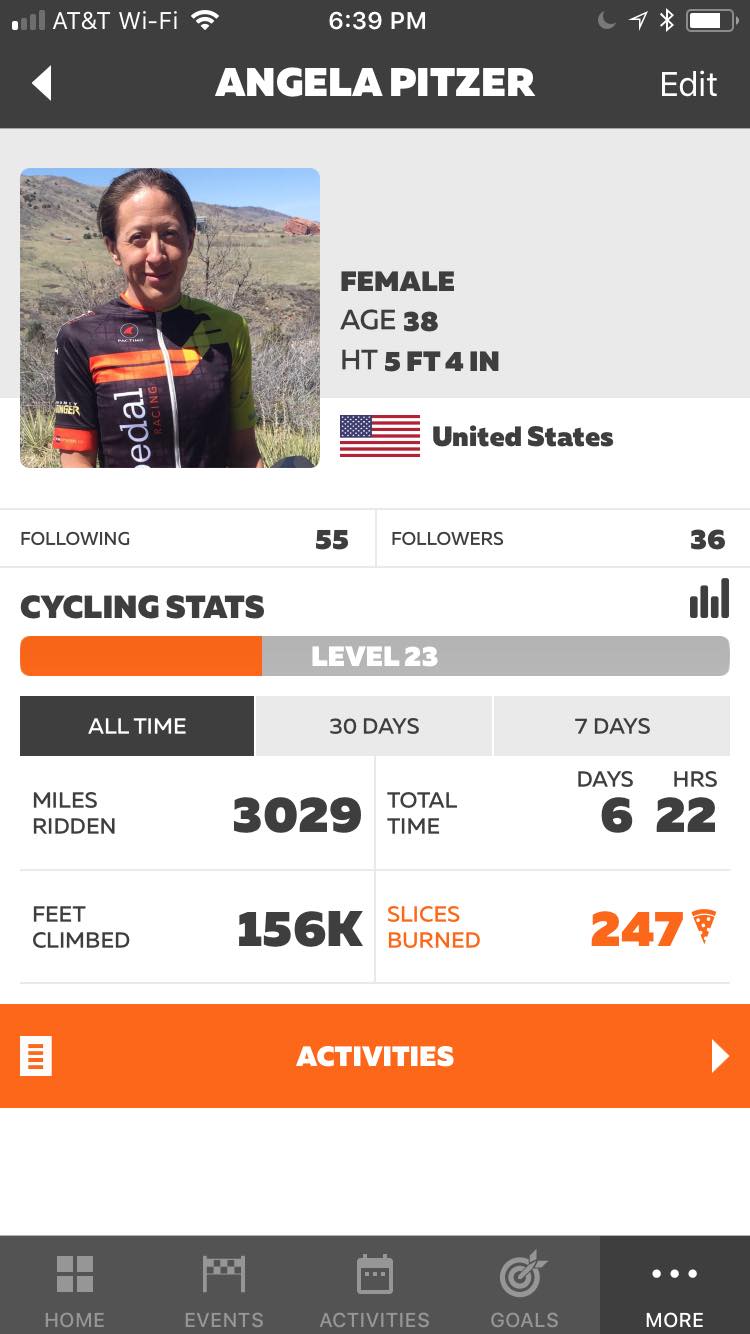
Angela: Oh. There are races that I race in that I ask myself, “Why am I out here suffering?” It’s kind of miserable sometimes. The truth is I love it, you know. I’ve always liked to ride my bike and racing just seemed like the next step, the next thing to try. I think it keeps me motivated to take better care of myself. I eat better, I try to get more sleep. It’s something that my husband and I both enjoy doing together, so in that respect, it’s good for our marriage I think. I think it makes me a better mom. My kids see me making healthy lifestyle choices. They see how much I train. They see what it looks like to work hard. They see that sometimes you work really hard and you can achieve goals and sometimes you don’t. And at the end of day, it’s okay.
I want to teach them that there can be humbleness in success and that they have to be gracious when they fail.
I just feel like all around it makes me a better person. I like to push myself. I am competitive, and I think most women are if they really would just admit it to themselves. I think that’s okay.
Jessica: Yeah, I mean you shouldn’t feel bad about being competitive. I think it’s an awesome quality to have.
I really appreciate you taking the time to chat with me tonight.
Angela: Oh no, thank you. I appreciate you taking your time.
And one other quick, quirky thing is that during the 7th race of the series, they had a cycling team, La Grange, out in California, they had an event at one of the bike shops out there. They had about 10 or 12 women from that cycling team, riding that race against us. So that night we had a larger field than we normally had and they did a whole Zwift podcast. We didn’t even know that was happening until after the fact. I was kind of like, “Why is this race so hard?” and I started getting on the internet to see and they had broadcasted it on Facebook. That’s what it was. So, they did some quirky things with us too that made it kind of interesting.
Jessica: Oh wow. Crazy. Keeping you on your toes. I’ll let you get back to your evening.
Angela: Thanks, Jessica.
Thanks to my patrons who make my writing possible. You can become part of our club here:
Become a Patron!